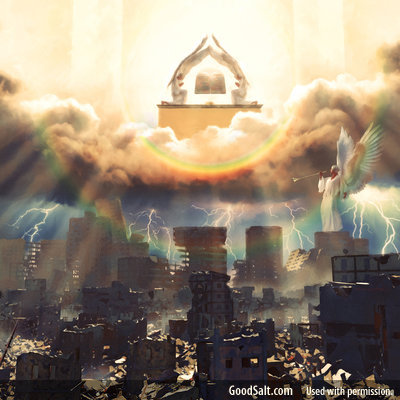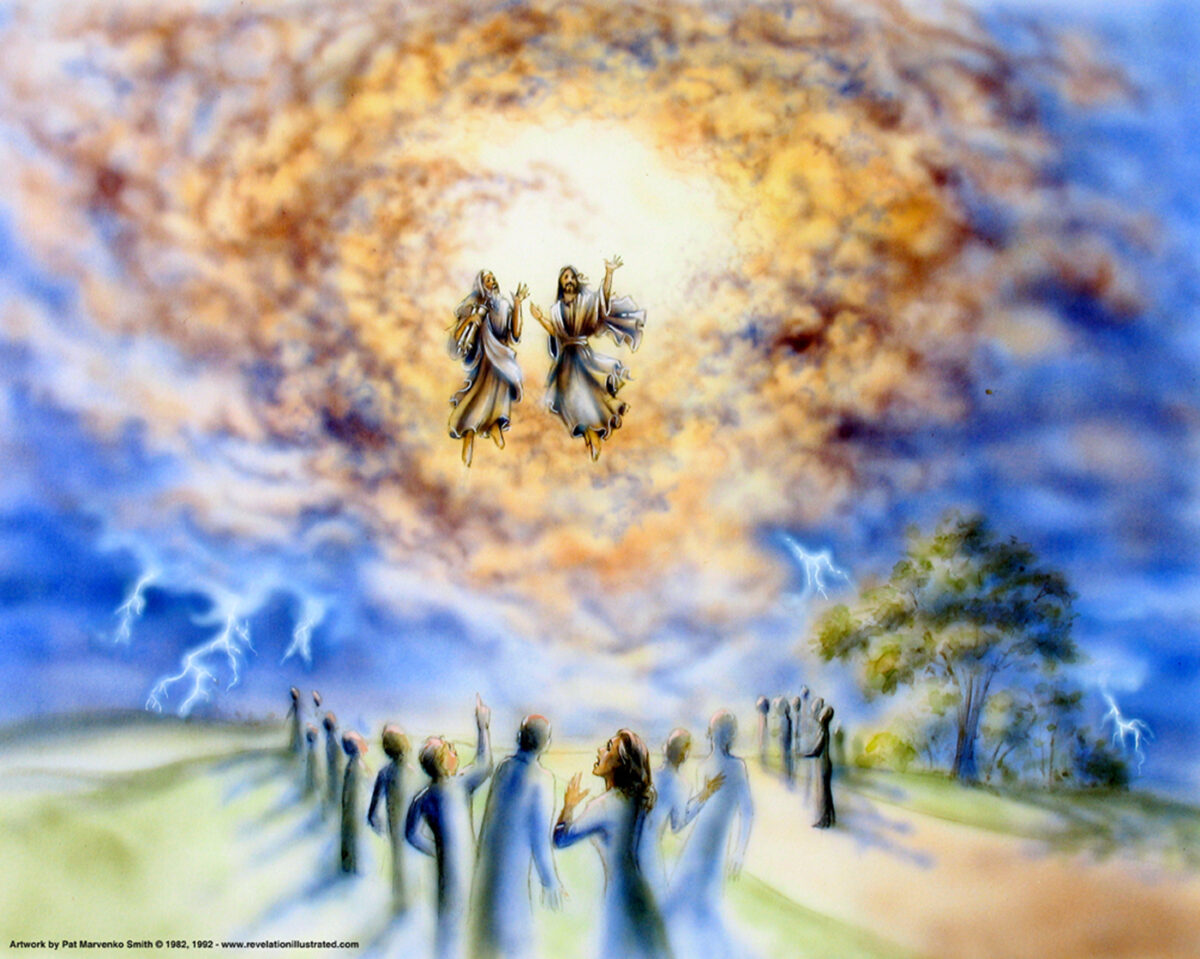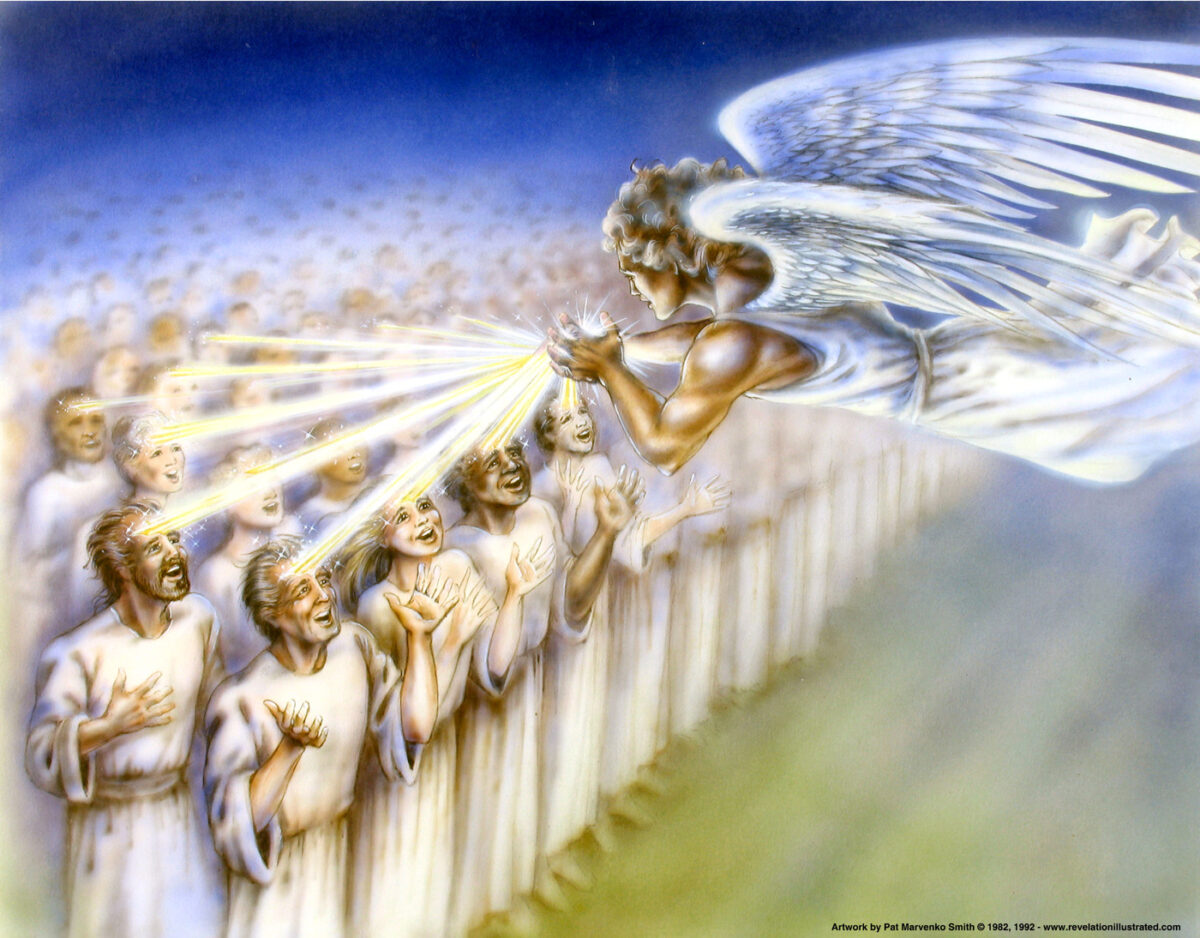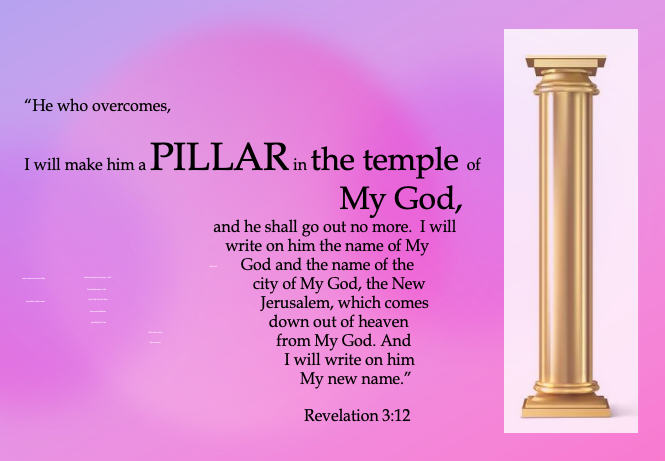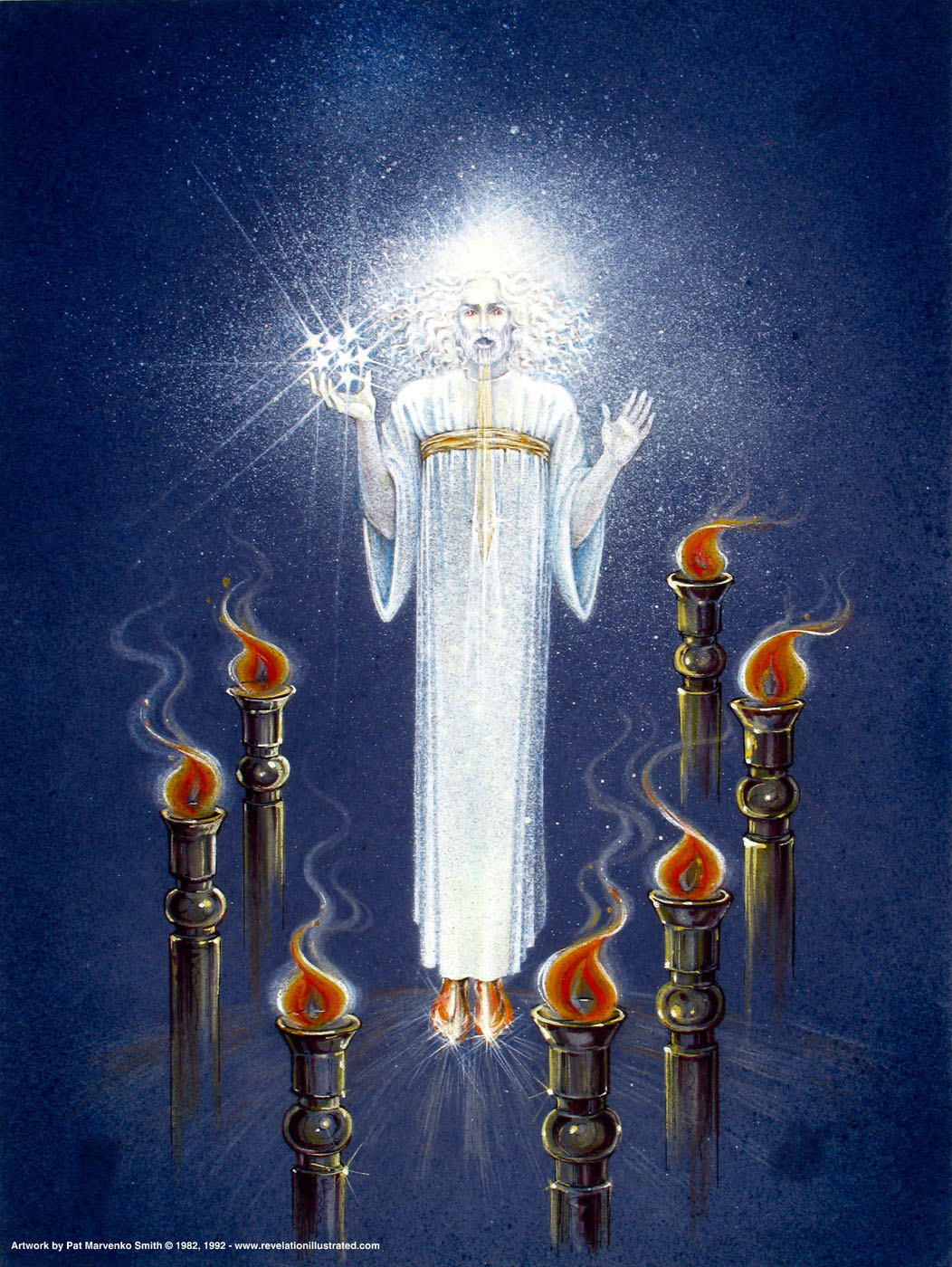“Then the temple of God was opened in heaven, and the ark of His covenant was seen in His temple.” Revelation 11:19
Since the first century when Jesus taught His disciples to pray, “Our Father in heaven, hallowed be Your name. Your kingdom come. Your will be done on earth as it is in heaven” (Matthew 6:9-10), Christians have been praying this prayer often. By the time the apostle John wrote the book of Revelation in 96 A.D., reciting this prayer was probably a widespread practice. 1
Although Christians have faithfully prayed this prayer since the first century, most of this ancient prayer has not been answered literally. In Matthew 6:10, Christ prayed, “Your kingdom come.” If we are honest with ourselves when we look at world affairs, none of us would conclude that God’s kingdom has literally come to earth where His will is “done on earth as it is in heaven.” As a matter of fact, when we turn on the news, it seems more like Satan’s kingdom has come and his will is done all around the globe.2
During this church age Christians are to make disciples of Jesus by preaching the gospel of Christ’s death and resurrection to a lost world (Mark 16:15; I Corinthians 15:3-6), followed by baptizing those who believe the gospel as the first step of discipleship, and then teaching them to obey all Christ’s commands (Mark 16:15; Matthew 28:19-20). But the day when King Jesus rules on the earth so that the Father’s will is “done on earth as it is in heaven” will not take place until after the seven-year Tribulation on earth (Revelation 11:15-19; 19:11-20:6).
What a glorious day that will be when Jesus sits on His throne in Jerusalem and rules with a rod of iron so that all His subjects will obey Him, and universal peace will be established (Isaiah 2:4; 9:6-7; 11:6-9; Psalm 2). As glorious as Christ’s kingdom on earth will be, we must not forget that it will be preceded by terrible judgments during the final part of the seven-year Tribulation. With the sounding of the seventh trumpet judgment, God prepares the apostle John, and us (Revelation 11:15-19), for the seven horrific bowls of wrath (cf. Revelation 16) immediately before Christ returns to set up His kingdom on earth. 3
The apostle John writes, “Then the seventh angel sounded: And there were loud voices in heaven, saying, ‘The kingdoms of this world has become the kingdom of our Lord and of His Christ, and He shall reign forever and ever!’” (Revelation 11:15). When “the seventh angel sounded” his trumpet, “there were loud voices in heaven saying, ‘The kingdom of this world has become the kingdom of our Lord (God the Father) and of His Christ (God the Son), and He shall reign forever and ever!’” These voices in heaven refer to the future reign of Christ on the earth in the past tense as if it has already taken place. 4 Their declaration of King Jesus’ future reign is anticipatory. 5
“The actual coronation of Christ will not come to pass until He returns to earth after the seven-year Tribulation is complete, but heaven is already singing about it and viewing it as accomplished. Once He is crowned as king, Christ will ‘reign forever and ever!’ ‘And of His kingdom there will be no end’” (Luke 1:33).” 6
Some Bible students believe Revelation 11:15 refers to the Rapture of the church at the midpoint of the Tribulation, equating “the last trumpet” in 1 Corinthians 15:52 and I Thessalonians 4:16 with the seventh trumpet in Revelation 11:15. 7 There are several flaws with this midtribulation rapture position:
1. It fails to realize that the church was raptured at the end of the church age as represented by the twenty-four elders in heaven (cf. Revelations 4:1-4; see Revelation 4 – Parts 1 and 2 articles) and is therefore already in heaven when Revelation 11:15-19 announces the future reign of Christ on the earth.
2. It fails to distinguish the Rapture with the Second Coming of Christ. The Rapture is when Christ will come in the air to receive believers into heaven (I Thessalonians 4:13-18; cf. John 14:1-3; Revelation 4:1-4). He will not come all the way down to earth in the Rapture. He will only do that at the Second Coming, when He will be accompanied by the church age saints (Revelation 19:7-21; cf. I Thessalonians 3:13; Jude 1:14). 8
3. It fails to distinguish the “last trumpet” of the church age in I Corinthians 15:52 when church age believers are caught up to meet Jesus in the air (I Thessalonians 4:16) from the seventh trumpet judgment in Revelation 11:15 which announces Christ’s return to earth at the end of the Tribulation with church age saints to judge His enemies (cf. Revelation 19:11-21).
“Simply because the trumpet in 1 Corinthians 15 is called the ‘last’ trumpet does not mean that it is the last trumpet in God’s whole prophetic program. As Paul Benware notes, ‘Those of us in school settings know that during the day there are a number of ‘last’ bells that ring. The last bell for the eight o’clock class rings but that is not the last bell of the day. ‘Last’ must be understood in relationship to the context in which it is found.” 9
“Furthermore, the seventh trumpet in Revelation 11 is not the last trumpet in the Tribulation. At the second coming of Christ a trumpet is blown to gather God’s elect (Matthew 24:31). So, the last trumpet argument actually undermines” 10 the midtribulation rapture view.
4. The trumpet that summons the church is called “the trumpet of God” (I Thessalonians 4:16) while the “seventh trumpet” is an angel’s trumpet (Revelation 11:15). 11 Strombeck well observes: “In the search for ‘the last trump’ one must, then, be guided by the fact that it is God’s own trumpet, sounded by the Lord Himself. In view of this one would hardly be willing to contend that the last trumpet of God is the last of a series of trumpets blown by the priests of the Aaronic priesthood. These were not in a class with the trumpet of God. Remembering that the angels are only a little higher than man, it is just as contrary to the laws of logic to say that ‘the last trump,’ which is God’s own trumpet, is the last of a series of trumpets blown by angels. Both men and angels are creatures of God. They cannot sound the trumpet of the Creator.” 12
5. The trumpet for the church is singular (I Corinthians 15:52; I Thessalonians 4:16). No trumpets have preceded it so that it cannot be said to be the last of a series like the trumpet in Revelation 11 that closes the Tribulation period as the last of a series of seven. 13
6. The trumpet in 1 Thessalonians 4 issues in comfort and hope, while the trumpet in Revelation 11 issues in judgment upon God’s enemies.
7. In the I Corinthian passage the trumpet sounds “in a moment, in the twinkling of an eye” (15:52). In Revelation 10:7 the indication is that the seventh trumpet shall sound over a continued period of time, probably for the duration of the bowl judgments that fall under it (Revelation 16), for John speaks of the angel that shall “begin to sound.” The duration gives evidence of the distinction in these two. 14
8. The trumpet in 1 Thessalonians 4 is distinctly for the church. Since God is dealing with Israel in particular, and Gentiles in general, during the Tribulation period (cf. Daniel 9:24-27), this seventh trumpet, which falls in the period of the Tribulation, could not have reference to the church without losing the distinctions between the church and Israel. 15
9. While the church will be rewarded at the time of the Rapture, yet the reward given to “Your servants the prophets and the saints” (11:18), cannot be that event. The rewarding mentioned in Revelation 11:18 is seen to take place on the earth after the Second Coming of Christ to earth, following the judgment of His enemies. Since the church is rewarded in heaven following the Rapture (see Revelation 4:1-4; cf. 2 Corinthians 5:10), these must be two distinct events. 16
10. While the midtribulation rapturist agrees that Christians will be spared from the wrath of God that is poured out on the earth, they hold that the wrath begins at the midpoint of the seven-year Tribulation with the seventh trumpet. 17 The problem here is this contradicts what Jesus taught when He surveyed the entire seven-year Tribulation period in Matthew 24:4-14. Christ said God’s wrath would be poured out upon the earth in the first (Matthew 24:4-8) and second (Matthew 24:9-14) halves of the Tribulation, with more details given about the second half’s more intense judgments (Matthew 24:9-22). Matthew 24:5-8 describe the first half of the Tribulation period consisting of judgments depicting the second, third, and fourth seal judgments of Revelation 6:3-8 which take place long before the seventh trumpet of Revelation 11:15.
11. Finally, the midtribulation rapture position undermines the doctrine of imminency which is drawn from several New Testament passages stating directly or indirectly that the Rapture could happen at any moment without any warning or signs: 18
– Matthew 24:36: “But of that day and hour no one knows.” Throughout Matthew 24:5-31 there are many observable “signs” or “warnings” that signal Christ’s future return to earth. In Matthew 24:32-35 Jesus commands His disciples to “learn this parable from the fig tree” and “When you see all these things, know that it [His return to earth] is near.” But when we come to Matthew 24:36, Jesus says, “But of that day and hour no one knows.” Now Jesus is talking about His coming without any preceding observable signs that signal His return. Jesus is talking about two different aspects of His Second Coming – one that involves observable signs before Christ returns to earth to judge His enemies (Matthew 24:4-31; cf. Revelation’s description of the seal, trumpet, and bowl judgments prior to King Jesus’ return to earth) and one that involves no observable signs before Jesus removes His church from the earth to meet Him in the air (Matthew 24:36-44; cf. I Thessalonians 1:10; 4:13-5:11; Revelation 4:1-4).
– I Corinthians 1:7: “eagerly waiting for the revelation of our Lord Jesus Christ.” Why would Paul be “eagerly waiting” for Christ’s return if many observable signs must take place first?
– I Corinthians 16:22: “O Lord, come!” Why would the apostle Paul ask the Lord to “come” at this time if His coming was a long way off?
– Philippians 3:20: “For our citizenship is in heaven, from which we also eagerly wait for the Savior, the Lord Jesus Christ.” Believers in the first century expected to meet their Savior at His return, not judgments on the earth.
– Philippians 4:5: “The Lord is at hand.” How can Paul expect the Lord’s return to be “at hand” or near if many observable signs must take place first?
– I Thessalonians 1:10: “wait for His Son from heaven, whom He raised from the dead, even Jesus who delivers us from the wrath to come.” The verb “wait” (anamenein)is in the present tense which means they were to wait continuously and literally means to “wait up for” like a parent waiting up for and looking for a child that he or she expects to be home at any moment. 19
– I Thessalonians4:15, 17: “15 For this we say to you by the word of the Lord, that we who are alive and remain until the coming of the Lord will by no means precede those who are asleep… 17 Then we who are alive and remain shall be caught up together with them in the clouds to meet the Lord in the air. And thus we shall always be with the Lord.” The apostle Paul includes himself among those who expected to be “alive” when believers would be “caught up” to meet Jesus “in the air” to “always be with” Christ in heaven. In his mind, Christ could return for His church at any moment.
– Titus 2:13: “looking for the blessed hope and glorious appearing of our great God and Savior Jesus Christ.” Why be constantly “looking” for Christ if He can’t come at any moment?
– Hebrews 9:28: “To those who eagerly wait for Him He will appear a second time, apart from sin, for salvation.” Why “eagerly wait” for Jesus’ coming if it is a long way off?
– James 5:7-9: “7 Therefore be patient, brethren, until the coming of the Lord… 8 You also be patient. Establish your hearts, for the coming of the Lord is at hand. 9 Do not grumble against one another, brethren, lest you be condemned. Behold, the Judge is standing at the door!” How can one expect the Lord’s coming to be “at hand” or near if many observable signs must take place first?
– I Peter 1:13: “Be sober, and rest your hope fully upon the grace that is to be brought to you at the revelation of Jesus Christ.”
– Jude 1:21: “Keep yourselves in the love of God, looking for the mercy of our Lord Jesus Christ unto eternal life.”
– Revelation 3:11; 22:7, 12, 20: “I am coming quickly.” Why would Jesus promise that He is coming quickly if His return was delayed?
“All these Scriptures refer to the Rapture and speak of it as though it could occur at any moment. In some ways, anticipating Christ’s return could be compared to living in California and waiting for an earthquake. You can be certain, living there, that an earthquake will happen; it’s only a matter of time. It may be soon or it may happen a decade from now, but it will most assuredly happen. It could also happen at any moment. And it could happen without warning. Sure, there could be tremors ahead of time, but not necessarily.
“This is similar to the way pretribulationists think about the Rapture. When it comes to imminency, they have three main ideas in mind: it could happen at any moment; it could happen without warning; and it will certainly happen, even if it doesn’t happen soon.” 20
Christ warns in Matthew 24:45-51 that if a believer removes the imminency of His return (which midtribulationism does since many observable signs must take place prior to Christ’s return), and begins to think, “My master is delaying his coming” (24:48b), it is more likely to lead to a self-indulgent lifestyle now (he “begins to beat his fellow servants, and to eat and drink with the drunkards” – 24:49), and the loss of rewards in the future (Matthew 24:50-51).
Swindoll writes with regard to the trumpet blasts of I Corinthians 15/I Thessalonians 4 and Revelation 11:15, that, “it appears that these two trumpet blasts refer to separate prophetic events. Paul’s ‘last trumpet’ announces the resurrection, rapture, and rescue of the church from the earth before the seven-year Tribulation period. The seventh trumpet blast of Revelation 11 brings the series of trumpet judgments to a close, previews both the wrath and reign of Christ, and makes way for the visions leading up to the seven bowls of wrath (chapters 12–16).” 21
With this said, let’s continue to look at Revelation 11:15-19. Next, the apostle John writes, “16 And the twenty-four elders who sat before God on their thrones fell on their faces and worshiped God. 17 saying: ‘We give You thanks, O Lord God Almighty, the One who is and who was and who is to come, because You have taken Your great power and reigned.’” (Revelation 11:16-17). We already saw in Revelation 4:1-4, that “the twenty-four elders” represent believers from the church age who have already been raptured and rewarded at the Judgment Seat of Christ (see Revelation 4, Parts 1 and 2 articles).
When these church age believers heard the announcement in verse 15, they “fell on their faces and worshiped” the eternal “God” whose existence was uninterrupted (“who is and who was and who is to come”), making His endless reign on the earth possible (11:17). 22
“Until now God had allowed powers hostile to His people to control the earth, but now He will begin to rule directly.” 23
These elders were giving thanks to God because He has taken His “great power and reigned.” The often-recited prayer, “Your kingdom come” (Matthew 6:10), will soon be fulfilled. Finally, the many Old and New Testament prophecies of Jesus’ Second Coming to rule on the earth will be actualized. This will be an incredible victory whereby the kingdom of this world will become the kingdom of our Lord Jesus Christ (11:15-16).
The establishment of Christ’s reign is so certain, it is communicated in the past tense. Swindoll states, “In John’s vision, these events are viewed as already accomplished, but we should not let this fact confuse us. From our perspective, all of the events described in 11:16-18 are still in the future. However, because the purposes of God cannot change and the prophesied events are certain, we can join the heavenly throng in praising God for what He will do.” 24
This worship in heaven will be contrasted with the rebellion of humanity on the earth. “The nations were angry, and Your wrath has come, and the time of the dead, that they should be judged, and that You should reward Your servants the prophets and the saints, and those who fear Your name, small and great, and should destroy those who destroy the earth.” (Revelation 11:18). At the end of the Tribulation period when the Lord Jesus returns to earth (Revelation 19:11-21), there will be a time of intense “wrath” in which the angry nations of the world under the control of Satan will be defeated by Christ, making way for the establishment of Jesus’ throne on the earth (11:17b-18a; cf. Psalm 2:1-12). Then another resurrection will take place when John writes, “and the time of the dead, that they should be judged” (11:18b). This is not the resurrection of church age believers because that occurs at the Rapture (I Thessalonians 4:13-18). This is the resurrection of God’s Old Testament “servants the prophets” (cf. Daniel 12:1-3) and Tribulation “saints” who will be given the “reward” they are due along with those who “fear” His “name,” both the insignificant (“small”) and influential (“great”)(11:18c).
When Jesus returns to the earth, He will “destroy those who destroy the earth,” which is most likely a reference to the judgment of the great harlot (cf. Revelation 17:1), whose devastating and destructive influence over the nations is referred to three other times in Revelation (cf. 14:8; 18:3; 19:2). Hence, “the twenty-four elders give anticipatory thanks because Christ reigns, evildoers are judged, and the faithful in Christ are rewarded.” 25
“Then the temple of God was opened in heaven, and the ark of His covenant was seen in the temple. And there were lightnings, noises, thunderings, an earthquake, and great hail.” (Revelation 11:19). John then saw “the temple of God… opened in heaven” where “the ark of His covenant was seen in the temple,” a symbol of God’s presence and faithfulness. In the Old Testament the presence of God dwelt between the cherubim on the ark (cf. 1 Samuel 4:4). It was the ark of God that led Israel across the Jordan and into their inheritance (cf. Joshua 3–4). Just as God protected and kept His promises to His people in the Old Testament, God will also do the same for His people in the Tribulation. 26
The accompaniment of “lightnings, noises, thunderings, an earthquake, and great hail” signifies the awesome power of God. As great as God’s judgments were in Revelation 6-11 leading up to the bowl judgments, the storms He will send on rebellious humankind in Revelation 12-19 will be even worse, like none the world has ever seen before (cf. Matthew 24:21). 27
John’s vision of the open temple in heaven (Revelation 11:19) shows us that believers in Jesus have unlimited access into God’s presence at any time which is based on the grace of God whose forgiveness was purchased for us by the blood of Christ. In addition, as His beloved children, we are also free from His coming wrath on the earth. Christians will not experience the seventh trumpet judgment nor any of the other judgments in Revelation 6-19 because they will have been removed from the earth via the Rapture of the church (Revelation 4:1-4; cf. 1 Thessalonians 1:9-10; 4:13-5:11). We will have already been transformed and taken to heaven at Paul’s “last trumpet” (1 Thessalonians 4:16). While unbelievers endure the Tribulation on earth, the church will be preparing to return with Christ to earth where He will reign a thousand years (Revelation 17:14; 19:7-20:6). 28
If you were to die right now, do you know for sure you will enter the door into God’s temple in heaven? It is open to all who come to God on His terms.The “ark of the covenant” inside God’s heavenly temple (11:19) contains the Ten Commandments (Deuteronomy 10:2), which are a constant reminder of God’s holy standard. The Bible tells us that all of us have sinned and fall short of God’s righteous standard (Romans 3:23). The penalty for our sin is death or separation from God (Romans 6:23).
In the Old Testament, God would meet with His people above the atonement cover or mercy seat over the golden chest of the ark between the two cherubim (Exodus 25:22). On the Day of atonement (Leviticus 16), the high priest sprinkled blood on the mercy seat to cover or make atonement for Israel’s sin (Exodus 30:10). The atonement cover represented for Israel what was later accomplished by Christ, Who as the Lamb of God (John 1:29), made atonement for sin (Romans 3:25; Hebrews 9:11-14) by His shed blood (Ephesians 1:7; 1 Peter 1:18-19).
Through His death and resurrection nearly two thousand years ago (cf. I Corinthians 15:3-6), Jesus made it possible for us to receive eternal life and unlimited forgiveness of sins if we would simply believe in Him alone (John 3:14-16; Acts 10:43). Christ said, “Most assuredly, I say to you, he who hears My word and believes in Him who sent Me has everlasting life, and shall not come into judgment, but has passed from death into life.” (John 5:24). What does Jesus say you must do to have eternal life and enter His temple in heaven?He says you must “hear” and “believe.”
When one “hears” His Word and “believes” what He says, Jesus says he “has everlasting life.” That means right now, not after you die. How long is everlasting life? It is forever! Next, Christ guarantees that you “shall not come into judgment.” That is a promise and God does not break His promises. A believer in Jesus Christ will not be judged for his or her sins in the future because Christ was already judged for our sins when He died on the cross. Such a one has “passed from death into life.”That means death is behind him, not before him. It is past, not present or future.
Again, I will ask you, have you heard Jesus’ promise of eternal life and believed Him for it? If so, you now have unlimited access into God’s presence in heaven. You can boldly approach Him at any time about anything because of the shed blood of Jesus Christ. “Let us therefore come boldly to the throne of grace, that we may obtain mercy and find grace to help in time of need.” (Hebrews 4:16). What is your greatest need right now? You can boldly approach God in prayer to meet that need. If heaven’s door is open to you, take time to enjoy your unlimited access to your heavenly Father. 29
In summary, while judgment is taking place on the earth during the Tribulation period, the occupants of heaven are worshipping and giving thanks to Christ as they anticipate His return when He will reign on earth, judge evildoers, and reward faithful Old Testament and Tribulation believers (11:15-19). As Christians living today during a time of spiritual decline throughout the world, we can worship and give thanks to the Lord Jesus Who will return one day to rule the earth, judge those who have rejected Him and His Word, and reward those who lived faithfully for Him. May He find each of us who know Him as our Savior, faithful to Him.
Prayer: Father God, thank You for this seventh trumpet blast which announces the certainty of Jesus’ return to earth to defeat His enemies and establish His throne. John was so clear and certain of this that he used the past tense to declare this long-awaited truth. May our response also be one of confidence and hope. Please use us to proclaim the good news of Jesus’ death and resurrection so more people will have unlimited access into Your presence the moment they believe in Christ. In His matchless name, we pray. Amen.
ENDNOTES:
1. Charles R. Swindoll, Insights on Revelation, (Swindoll’s Living Insights New Testament Commentary Book 15, Tyndale House Publishers, Inc., 2014 Kindle Edition), pg. 223.
2. Adapted from Ibid., pg. 224.
3. Ibid., pg. 224.
4. The words translated “have become” is a prophetic use of the aorist participle egeneto. See Archibald Thomas Robertson, A. T. Robertson’s Word Pictures in the New Testament [with Bible and Strong’s Numbers Added!], 6 Volumes (E4 Group, 2014 Kindle Edition), Kindle Locations 221057-221060.
5. Bob Vacendak; Robert Wilkin; J. Bond; Gary Derickson; Brad Doskocil; Zane Hodges; Dwight Hunt; Shawn Leach. The Grace New Testament Commentary: Revised Edition (Grace Evangelical Society, Kindle Edition, 2019), pg. 1539.
6. Ibid.
7. J. Dwight Pentecost, Things to Come (Zondervan Academic, 2010 Kindle Edition), pp. 196-197 cites Norman B. Harrison, The End (Minneapolis, Minnesota: Harrison Service, 1941), pg. 75.
8. Tony Evans, CSB Bibles by Holman, The Tony Evans Bible Commentary (B & H Publishing Group, Kindle Edition, 2019), pg. 2395.
9. Mark Hitchcock, The End: A Complete Overview of Bible Prophecy and the End of Days (Carol Stream, IL: Tyndale House Publishers, Inc., 2012 Kindle Edition), pg. 137 cites Paul N. Benware, Understanding End Times Prophecy (Chicago: Moody, 1995), pg. 219.
10. Ibid.
11. Pentecost, pg. 198.
12. Ibid., cites J. F. Strombeck, First the Rapture (Moline, Illinois: Strombeck Agency, Inc., 1950), pg. 109.
13. Ibid.
14. Ibid.
15. Ibid., pp. 198-199.
16. Ibid., pg. 199.
17. Hitchcock, pg. 168.
18. Ibid, pp. 167-168.
19. Ibid., pg. 168.
20. Ibid., pp. 168-169.
21. Swindoll, pg. 227.
22. Tom Constable, Notes on Revelation, 2017 Edition, pg. 130.
23. Ibid.
24. Swindoll, pg. 227.
25. Vacendak, pp. 1539-1540.
26. Ibid., pg. 1540.
27. Ibid.
28. Swindoll, pg. 229.
29. Adapted from Ibid., pp. 229-230.

